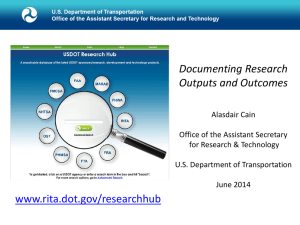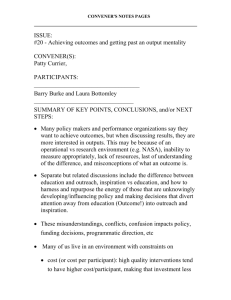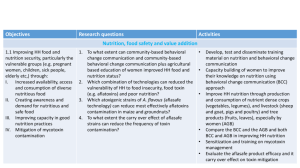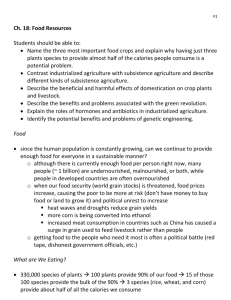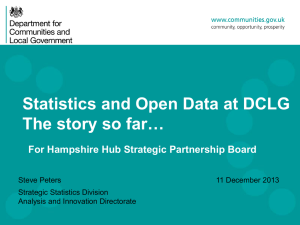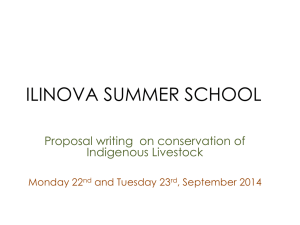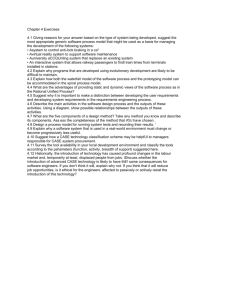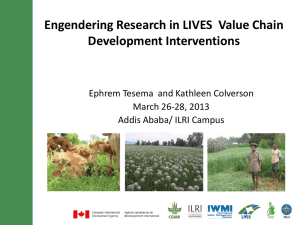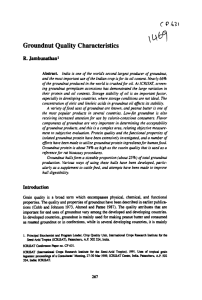(anonymous) - ILRI Research Computing
advertisement
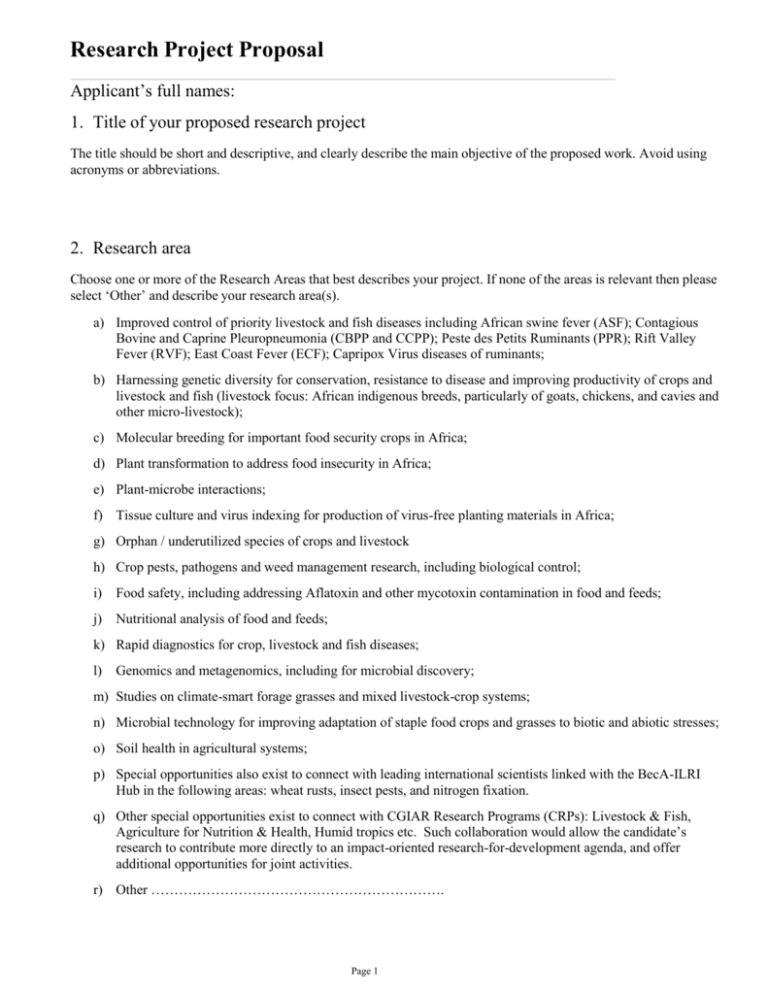
Research Project Proposal Applicant’s full names: 1. Title of your proposed research project The title should be short and descriptive, and clearly describe the main objective of the proposed work. Avoid using acronyms or abbreviations. 2. Research area Choose one or more of the Research Areas that best describes your project. If none of the areas is relevant then please select ‘Other’ and describe your research area(s). a) Improved control of priority livestock and fish diseases including African swine fever (ASF); Contagious Bovine and Caprine Pleuropneumonia (CBPP and CCPP); Peste des Petits Ruminants (PPR); Rift Valley Fever (RVF); East Coast Fever (ECF); Capripox Virus diseases of ruminants; b) Harnessing genetic diversity for conservation, resistance to disease and improving productivity of crops and livestock and fish (livestock focus: African indigenous breeds, particularly of goats, chickens, and cavies and other micro-livestock); c) Molecular breeding for important food security crops in Africa; d) Plant transformation to address food insecurity in Africa; e) Plant-microbe interactions; f) Tissue culture and virus indexing for production of virus-free planting materials in Africa; g) Orphan / underutilized species of crops and livestock h) Crop pests, pathogens and weed management research, including biological control; i) Food safety, including addressing Aflatoxin and other mycotoxin contamination in food and feeds; j) Nutritional analysis of food and feeds; k) Rapid diagnostics for crop, livestock and fish diseases; l) Genomics and metagenomics, including for microbial discovery; m) Studies on climate-smart forage grasses and mixed livestock-crop systems; n) Microbial technology for improving adaptation of staple food crops and grasses to biotic and abiotic stresses; o) Soil health in agricultural systems; p) Special opportunities also exist to connect with leading international scientists linked with the BecA-ILRI Hub in the following areas: wheat rusts, insect pests, and nitrogen fixation. q) Other special opportunities exist to connect with CGIAR Research Programs (CRPs): Livestock & Fish, Agriculture for Nutrition & Health, Humid tropics etc. Such collaboration would allow the candidate’s research to contribute more directly to an impact-oriented research-for-development agenda, and offer additional opportunities for joint activities. r) Other ………………………………………………………. Page 1 3. Short summary (abstract) of your research project Give the relevant background information, state the problem, identify the solution and why it is novel, specify the objectives and the expected outputs. Also describe the direct and longer-term impacts of your research. (300 words maximum) 4. Statement of the problem, background & justification Describe the food and nutritional security or food safety problem that your research will address. What is the significance of the problem in Africa? Give current state of knowledge, and describe how your research will build upon what has already been done and why your work is novel. Justify why the proposed research should be conducted, and the importance of the science. (500 words maximum) Page 2 5. Research question and hypothesis State the research question(s), and give the hypothesis that you are testing with the research. A research hypothesis is a statement of expectation or prediction that will be tested by the research. This hypothesis should determine and drive the data collection for your study. (200 words maximum) 6. Research objectives The objectives are what you want to achieve by your research activities. Give no more than three objectives. Each objective should flow logically to the next. (150 words maximum) Page 3 7. Research plan Describe how you will accomplish each objective. Justify the research methods and explain why each step is important. Give details of organisms to be studied. It is very important that you describe the sampling design and data analysis. (1000 words maximum) Page 4 8. Biological materials Give details of the biological materials that you propose to bring to the BecA-ILRI Hub for your research project. Are the materials infectious to plants or animals? (100 words maximum) 9. Expected outputs of the research Expected outputs of a research project are the deliverables from the research (150 words maximum) Page 5 Tentative project timetable and start date 10. List each activity in chronological order, and give start and finish weeks (week 1 is the first week of your project at the BecA-ILRI Hub). Be realistic about what can be completed in the time frame. ABCF research fellowship projects are normally 3-12 months. Only in exceptional cases will projects for longer than 12 months be considered. Activity (Example Table) 1 2 3 4 5 6 7 8 Groundnut samples collection Jan 2015 Data collection using questionnaires Jan 2015 Isolation and characterization of groundnut seed March 2015 Aflatoxin analysis on groundnut samples April 2015 Planting material released and farmers groundnuts genotypes April 2014 Data Analysis March Start Week 1 1 1 1 1 Finish week 4 4 4 4 2 1 4 *Please note that BecA-ILRI Hub has the final decision on when you should report/ commence your fellowship 11.Skills for the proposed research project List the research skills you currently possess that you will apply to the proposed research project List the research skills that you would like to gain during the proposed research project at the BecA-ILRI Hub 12.Potential impact of your research outputs What will you do with the outputs of your research project when you return to your home institute? Describe how outputs of your project could lead to direct or longer-term impact to address food and nutritional security, food safety, poverty reduction or livelihoods. Describe your plan to ensure the outputs will ultimately lead to impact. (500 words maximum) Page 6 13.How does the proposed project link to your own research interests or a program of research at your institute? (250 words maximum) 14. Describe how an ABCF Research Fellowship will benefit your career as a researcher, and how it will build capacity for your research Programme, department or institution (250 words maximum) Page 7 15.References cited in the proposal List references that you have cited in support of your proposal. Some of the references should be recent publications, indicating that you are aware of the current research in your research area. List references in alphabetical order. All references listed must be cited in the text If you have co-funding for the proposed research project, please give details (including the amount) and why you need ABCF funding Please give any other information that you think is relevant to your application but was not captured elsewhere. Page 8 Page 9

